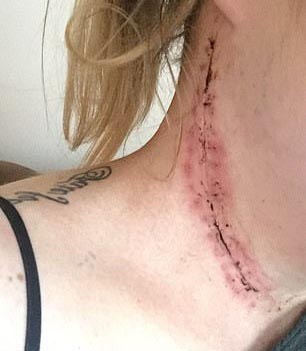A YOUNG woman thought a spot on her tongue was an STI and was too embarrassed to go to the doctor about it.
Olivia Wallace, then 20, didn’t realise she was seeing a cancer red flag, until the disease had spread.


The now 26-year-old put off going to the GP for seven months, thinking she had a recurring ulcer linked to an STI.
When she finally went for help after feeling pain when she ate, she was told it was stage four tongue cancer that had spread to the lymph nodes.
Having beaten the illness, she wants to share signs of cancer so young people know they should seek help.
Olivia has shared photos of a large scar on her neck, where she had a operation to remove the cancer.
After having chemotherapy and radiotherapy to treat the disease she is now cancer free six years on.
She told Chronicle Live: “The lump was growing bigger, and I convinced myself it was a sexually transmitted disease (STI), so it put me off going to the doctors for seven months.
“There is a stigma attached to young women and STI’s, so that deterred me from getting checked out even though it was frightening me.
“I didn’t feel like it was as bad as it was. I didn’t feel unwell other than this ulcer but I was probably walking around for months with stage four cancer.
“If I waited another month to get checked out, I may not be here right now.”
The tumour had grown quite large in her tongue, but she was shocked to be told it was cancer.
The young women from Sunderland added: “If I can help reduce the stigma for just one person who is too embarrassed to get something checked out on their body, then it proves why telling my story is worthwhile.”
Louise Soanes, Chief Nurse, Teenage Cancer Trust, said: “Cancer is far less likely to affect young people than older adults – but when it does it can have a devastating impact – so being able to spot potential warning signs that could lead to an earlier diagnosis really can make a difference.
“Listen to your body and if you feel that something isn’t right seek medical help. It probably isn’t cancer, but it’s always best to check, so book an appointment with your GP to discuss your concerns.
“If you don’t feel like you’re getting the answers you need to keep going back, because if a patient consistently presents with concerns, healthcare professionals should listen and take these seriously.”
Red flags for cancer in the mouth area can include:
- mouth ulcers
- red or white patches
- unusual lumps
- swelling
- hoarseness
- loose teeth
With the backlog in dental appointments made much worse by the pandemic, its important to keep an eye out on your mouth health.
Cases of mouth cancer have doubled in the UK in the last 20 years – with one person every hour being diagnosed with the disease.
According to the NHS, mouth cancer “is where a tumour develops in the lining of the mouth.”
Knowing signs of cancer isn’t easy, and especially hard if you’re younger and don’t expect to be on the look out.
But unfortunately anyone can get cancer, and so it’s a good idea to know lesser known symptoms to watch out for.
This may be on the tongue, the insides of the cheeks, the roof of your mouth, or on the lips or gums.






